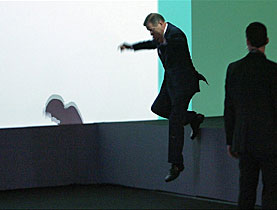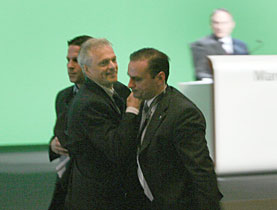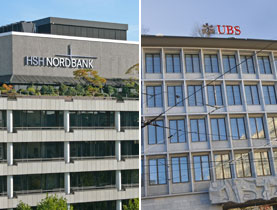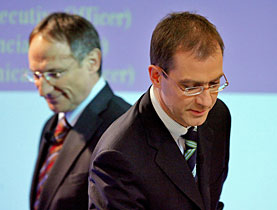Ospel goes as UBS woes continue

Switzerland's largest bank, UBS, is seeking SFr15 billion ($15.1 billion) in new capital after making a net loss of about SFr12 billion in the first quarter.
UBS – the European bank hardest hit by the United States subprime mortgage crisis – also said it had written down an additional $19 billion on US real estate and related credit positions.
The bank said in a statement on Tuesday that its embattled chairman, Marcel Ospel, would not seek re-election at the annual shareholders’ meeting on April 23.
The moves, though expected, are considered as dealing a new blow to the world’s largest wealth manager.
UBS said it would create a new division to deal with the ailing assets after its mortgage-related positions deteriorated further in the quarter. This is a clear move to draw a line under the crisis which has shaken investor confidence in the Swiss bank.
“The question remains whether finally all the skeletons have been cleared from the closet through today’s writedowns or whether there will be further problems. There is still room for more correction given the exposure,” analysts at the private bank Wegelin said in a note.
The writedowns come at the upper end of market expectations and on top of $18.4 billion in damage caused by the subprime crisis last year. This had already forced the bank to ask shareholder approval for SFr19 billion in capital-raising measures in February.
“We believe the capital increase and the creation of a vehicle to separate problem assets from the remainder of our businesses will allow us to return to sustainable value creation over time,” commented chief executive Marcel Rohner in a statement.
“Challenging conditions”
Rohner noted that profits from most of the bank’s businesses remained “acceptable in challenging conditions”.
He said the bank had made prompt writedowns and taken measures to check costs and strengthen the structure of the firm.
However, he noted that the environment remained difficult. “With these measures we have created the basis to weather one of the most difficult periods in the history of the industry.”
He also cautioned in a conference call with journalists that more job cuts in the group’s investment bank – source of the losses – were on the way.
“Clearly the industry is in a very difficult environment and we have to review the capacity with which we operate in this environmment,” Rohner said.
New chairman
UBS said Ospel is to be succeeded as chairman by Peter Kurer, the bank’s general counsel and a board member since 2002.
“I have always stated that I ultimately take responsibility for the bank’s situation,” Ospel said, adding “we have been able to address the firm’s most pressing problems”.
Analysts had expected the bank to write down an additional SFr10-20 billion in 2008.
The Federal Banking Commission in Bern welcomed Ospel’s decision not to stay on, saying it sent out a positive signal. It added that it was confident that Kurer and a new team would bring stability back to UBS.
However, analyst Peter Thorne at Helvea was not so convinced about Kurer’s credentials.
“The replacement of a lawyer as chairman is not the experienced man at the head of the organisation that we would like and the absence of a clear signal that the investment bank is going to be sold or completely refocused is also disappointing,” he wrote in a note.
“However, it may be that these are just interim measures whilst they search for a chairman with banking experience and wait to restructure the investment bank prior to its sale.”
swissinfo with agencies
UBS endured a tough 2007, starting with the collapse of its hedge fund Dillon Read Capital management. Two months after that, in July, chief executive Peter Wuffli abruptly departed without clear explanation.
In October of last year, UBS said it would cut 1,500 jobs in its investment banking arm, including its head Huw Jenkins. UBS chief financial officer, Clive Standish, also left at the same time.
Later that month the bank announced it was writing off SFr4.2 billion on subprime losses and SFr726 million pre-tax loss for the third quarter – the first quarterly loss in nine years.
In December UBS said another $10 billion would be written off as the US subprime crisis deepened.
A further $4 billion was written off in January, bringing the total losses to around SFr20 billion.
Net loss of SFr4.38 billion (SFr12.26 billion profit in 2006)
Operating expenses SFr8.59 billion (SFr8.65 billion 2006)
Employees: 83,560 (78,140 in 2006 and 83,814 in September 2007)

In compliance with the JTI standards
More: SWI swissinfo.ch certified by the Journalism Trust Initiative



You can find an overview of ongoing debates with our journalists here. Please join us!
If you want to start a conversation about a topic raised in this article or want to report factual errors, email us at english@swissinfo.ch.